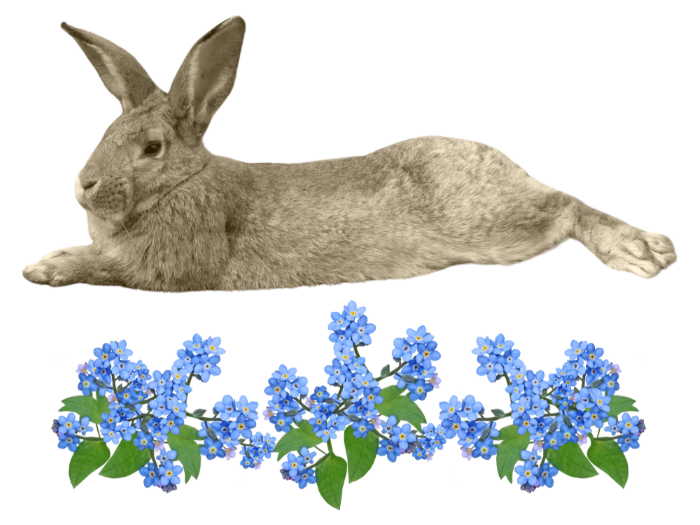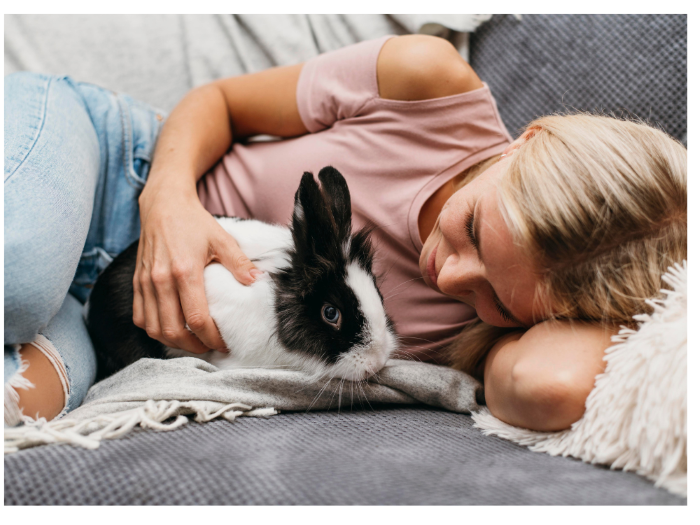As a homesteader with rabbits, or a rabbit pet owner, knowing about the basic biology of your animals is a must.
And the best way to attain this knowledge is by asking questions!
Some of the most common rabbit health questions include those regarding if bunnies get their period or if female rabbits go into heat.
No, female rabbits do not experience periods. Rabbits differ from many other mammals in this respect.
In this post, we will go over all basic information about the female rabbits’ reproductive window from our own experiences raising rabbits on our small hobby farm and support from some expert sources, so read on for a hefty dose of rabbit health 101!
H2 Do Bunnies Have A Period
As mentioned, female rabbits do NOT exhibit a consistent ‘period’ or menstrual cycle.
This is because the biology of rabbits (and most other mammals) is different from that of humans.
In fact, only humans, certain species of bats, the elephant shrew, and some other primates exhibit the specific phenomenon of menstruation.
What Is Menstruation?
Menstruation is when the lining of the uterus is shed, resulting in a flow of blood and other matter from the uterus (i.e. menses).
The words menstruation and menses comes from the latin word mensis which means month, hinting to the cyclical nature of this natural process.
Do Bunnies Get Their Periods: Female Rabbit Behavior
Instead of exhibiting a monthly cycle of menses, female rabbits undergo estrus.
Estrus, a cyclical phenomenon experienced by all other mammals, is marked by specific sexual activity that indicates the female is ‘in heat’, or fertile.
Menses vs Estrus
A quick note is that animals which exhibit menses are not sexually receptive during their menstruation.
Rather, ovulation (high fertility) occurs right after their menses, when the old lining of the uterus has finished being shed.
On the other hand, animals that exhibit estrus are fertile and sexually receptive only during thier time of estrus.
This is why estrus is marked by specifically sexual behavior.
Female Rabbits In Heat: Do Rabbits Get Periods and Bleed
Because female rabbits do NOT experience periods or menstrual bleeding, don’t expect your homestead or pet rabbits to menstrate as a sign of an upcoming fertility window.
It is also incorrect to think you will be able to tell when your doe reaches maturity by waiting for a first menstrual cycle.
Instead, time of sexually maturity in rabbits depends on the size and type of breed.
For example, smaller rabbit breeds always reach sexually maturity faster than larger breeds, usually at about 3-4 months of age. On the other hand, large and giant breeds won’t reach maturity until almost 7 months of age!
Read more about your rabbit’s breed from the American Rabbit Breeders Association.
Female Rabbits In Heat: Behavioral Clues
A rabbit doe in heat may exhibit several behavioral clues that she is sexually receptive, including:
- Acting more lively and restless than usual
- Wanting to be around other rabbits
- Laying flat with tail up when touched or petted
And if you want to know for sure, you can examine the vulva of your female rabbit.
During estres, it will be slightly swollen, wet, and purplish in color.
Outside of estrus, it will be small, dry, and whitish in color.
In our experience, the behavior clue of laying flat with tail up when touched or petting has been a key sign that our does are in estrus.
This is the natural position of mating and has greatly helped us determine the best time to present our female rabbits to male rabbits for breeding.

Rabbit Mating Season
Wild rabbits usually begin mating in late February and have their last litters around the end of summer, when the weather and food sources start to dwindle.
However, for domestic rabbits, there isn’t necessarily a mating season. Female rabbits will continue to experience their estrus cycle all year long and can be receptive to a male during the dead of winter.
Clearly, if you want to breed your rabbits during winter you must ensure the mother has a warm and wind/weather sheltered home and enough food and water.
Having babies in the winter is riskier, as rabbits are born hairless and blind, and rely heavily on the nest their mothers make to stay warm and her milk to grow strong.
Remember, rabbits have a quick gestation period of about 30 days, but baby rabbits should stay with their mother for about 2 months after birth!

Do Bunnies Bleed When In Heat
Because female rabbits do not experience menses, they do NOT bleed during heat.
The only time we have noticed a bit of blood below the hutch of our female rabbits is after they have given birth, as some of the birthing liquids may fall through the hutch bottom (although mother rabbits are usually very good at cleaning up after giving birth).
Rabbit Health: Red Urine
Unfortunately, it can be difficult to determine if your rabbit has blood in their urine or if it is simply a natural urine color variation caused by diet, stress, hydration level, or temperature.
Our rabbits have exhibited incredibly clear urine as well as darker, amber, and even slightly red urine color.
This is one of the reasons we recommend petting and engaging with your rabbit daily, as increased familiarity with your bunny will help you notice any behavioral changes. We’ve often recommended doing a daily health check with your rabbits.

For example, if you notice that your rabbit has urine that seems a little more red than usual, pay close attention to how they are acting, eating, and drinking. If they seem to go about their day normally, they are most likely fine!
But if they have lost a bit of appetite, are less active, or more aggressive, it is a good idea to check with your local vet to see if this coloration of their urine is serious.
Knowing your rabbit well is the best way to tell when they are ill or when something is off!
Especially as it is difficult to know just why their urine is a bit more red without proper testing equipment.
The most likely cause of reddish urine is vegetable pigments. If your bunny has been eating greens such as cabbage, dandelions, or broccoli, they may naturally exhibit reddish urine.
Don’t worry! These pigments are harmless and your rabbit is simply excreting them in their urine (this is just like when we humans eat lots of beetroot!).
However, if you ever notice that your rabbit has blood on their fur, is in pain during urination, or that there is a clear amount of what seems to be blood mixed in with their feces or urine, call your local vet immediately.
Rabbits only bleed like this when there is a serious kidney, urinary tract, or other significant internal health issue going on, so we highly recommend a vet visit for an accurate diagnosis and proper treatment!
Spaying Female Rabbits
If you are not interested in breeding your female rabbit, you may chat with your vet about spaying her.
Spaying is a process in which the ovaries of a female animal are removed. This effectively prohibits her from having kits and greatly changes her biology.
Remember, rabbits have a quick lifespan and as natural prey animals they have a strong drive for reproduction!
Therefore, spaying your female rabbit will greatly reduce (if not eliminate) her sexual behavior.
While we have never spayed one of our does, other rabbit raisers have experienced some changes after neutering their does including reduced territorial behavior and less inter-rabbit aggression.
Yarmouth Veterinary Center has a great page on considerations and reasons for spaying your rabbits; we recommend checking it out.
Frequently Asked Questions Related To Do Bunnies Get Their Periods
Do Female Bunnies Need To Be Spayed?
It is not necessary to spay your female rabbits.
However, spaying your female bunny is an option if you are sure you do not want to breed her or if you want to house her with a male rabbit without the risk of a litter.
Why Is My Rabbit Bleeding?
If your rabbit is bleeding from their genital area, it is NOT because they are experiencing a period.
Rather, this is most likely a serious kidney or internal health issue! We highly recommend chatting with your local vet immediately if this occurs.
Final Thoughts on Do Bunnies Get Periods
The most important fact to remember is that female rabbits do not get periods.
Rather, female rabbits experience cyclical estrus and the best way to tell if they are sexaually receptive are through the sexual behaviors they exhibit.
Knowing your rabbit well will also help you determine if slightly red urine is something to worry about or if it is just a result of diet, hydration, or stress levels.
Finally, check out our other posts regarding raising rabbits and rabbit health such as Ticks on Rabbits and Why Is My Bunny Losing Hair for other great information and best tips!
If you want more info on rabbit reproductive systems and natural cycles, check out this video!

